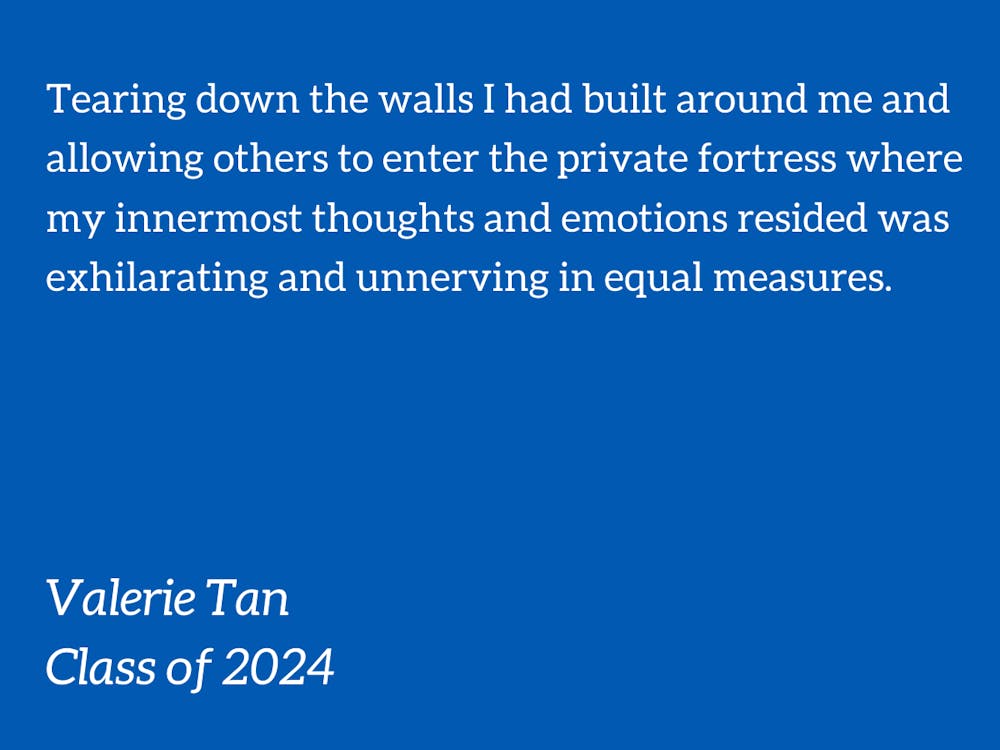As a perfectionist, I used to live under a self-imposed pressure to appear flawless in the eyes of others. Upholding this image required keeping everyone at arm’s length, lest they uncover my weaknesses and the insecurities lurking beneath my nonchalant facade.
College radically tempered these perfectionist tendencies, if only because the relentless socialization rendered it nearly impossible to maintain this distance. Being surrounded by friends most of the time coaxed me into letting my guard down subconsciously. Late night talks had a way of eliciting unexpected nuggets of information about myself that I had never planned on sharing. The more I revealed, the more others reciprocated, our mutuality giving rise to meaningful conversations and deeper connections. My closest friends got to know me so well that they could basically read me like a book. These were people I had barely known for months, but I found myself trusting them against my inner skeptic. It was difficult not to when they were the greatest source of comfort and familiarity away from home.
But having spent most of my life shying away from intimacy, I wasn’t sure how to respond to it. Tearing down the walls I had built around me and allowing others to enter the private fortress where my innermost thoughts and emotions resided was exhilarating and unnerving in equal measures.
It was endearing to have people whose lives had become so intertwined with mine that we could complete each other’s sentences and recite each other’s daily schedules by heart—people with whom even the most frivolous small talk had the potential to spontaneously escalate into a heartfelt exchange of musings on life. I loved how I knew all their quirky idiosyncrasies—just as they did mine—in a way that few others did. Becoming close friends with someone was an honor. I felt like I had a special status conferred upon me—a coveted membership to an exclusive club that I had earned my right to.
But giving so much of myself away also left me feeling naked and susceptible. It took a toll on my privacy; my friends had become so well-versed in my disposition and lifestyle that it was almost impossible to keep anything from them. At times, my openness was misconstrued as a standing invitation to broach sensitive topics, with some brazenly digging for answers even after I had clearly signaled my discomfort. Yet others repeatedly encroached on my personal space, having made the bold assumption that our friendship gave them a free pass to overstep my boundaries.
Sustaining the deep emotional connection I had formed with close friends was also stressful. The level of intimacy we had attained was unlike any I had experienced before, and I feared that I wasn’t capable of preserving it. I felt pressured to share everything about my life with my friends and always have something interesting and personal to disclose, while subconsciously harboring an expectation of reciprocity. It was as though our closeness was contingent on the exchange of exclusive information and accompanied by an unspoken obligation of transparency. But there were certain things that I just couldn’t bring myself to share with them, no matter how much I trusted them. Dubious intentions, embarrassing mistakes, lustful desires, bad habits, emotional struggles and childhood trauma belonged to this forbidden category. I could tell from the occasional pregnant pauses and evasive glances that they, too, had their own secrets to guard.
I’ve learnt that maintaining and developing close friendships requires astute judgment, trust and respect. It entails erecting and enforcing my own boundaries, while being mindful of others’ comfort zones. Knowing how much to share and how much to expect in return is an acquired skill that needs to be tailored to every individual. Oversharing purely for the sake of it benefits no one, diluting the significance of my words and failing to do justice to my experiences, while unnecessarily pressuring others to participate in the exchange against their will. Close friendships thrive on the mutual, unspoken understanding that certain topics are off limits for valid, even if unstated, reasons. The refusal to share stems not from distrust but the conviction that the other person understands and respects these boundaries. Even the most intimate relationships have lines that should not be breached.
These values now constitute my social bulwark. They are instruments of self-preservation, enabling me to experience intimacy without being trampled upon. They have heightened my radar towards red flags in relationships and emboldened me to reject advances from those who repeatedly trespass on my personal space.
I still find myself recoiling from intimacy from time to time, but my beloved friends serve as constant reminders of the beautiful surprises that can transpire when I allow myself to be vulnerable in front of others. Letting people come closer could be a good thing, so long as they don’t come too close for comfort.
Valerie Tan is a Pratt first-year. Her column usually runs on alternate Fridays.
Get The Chronicle straight to your inbox
Signup for our weekly newsletter. Cancel at any time.
Valerie Tan is a Pratt junior and an opinion managing editor of The Chronicle's 119th volume.

